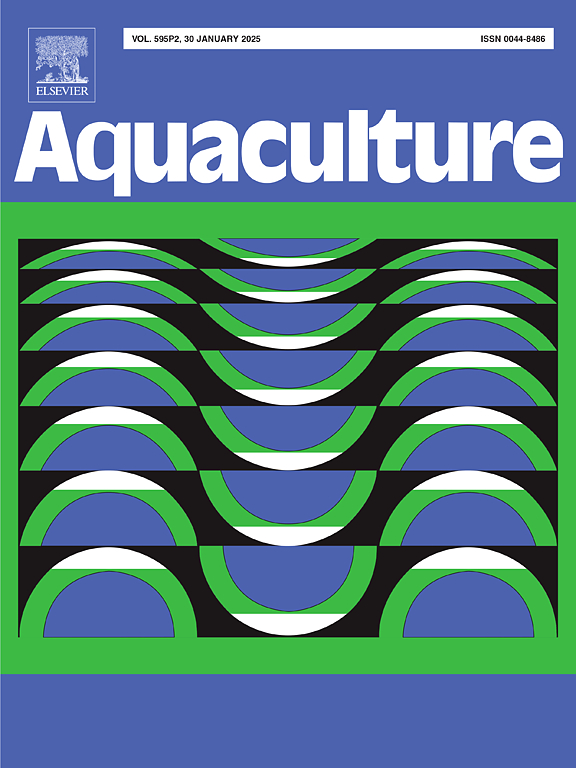Heat stress remediation by dietary selenium nanoparticle supplementation in Nile tilapia, Oreochromis niloticus, reared in brackish water
IF 3.9
1区 农林科学
Q1 FISHERIES
引用次数: 0
Abstract
Climate change poses significant challenges to the expansion of aquaculture production. Environmental stressors such as rising water temperatures, increased incidence of heat waves, and water salinization limit the growth of this industry. Identifying practical strategies to mitigate such effects is crucial for enhancing the sustainability of aquaculture. The present study aimed to evaluate the potential benefits of dietary selenium supplementation in Nile tilapia, Oreochromis niloticus, reared in brackish water for nine weeks, followed by a four-day heat stress challenge. Fish were fed diets containing 0 (control), 0.5, 1, and 2 mg/kg selenium nanoparticles in triplicate groups during nine weeks of rearing. Results indicated that dietary selenium significantly improved growth performance, feed efficiency, survival rates, and intestinal activities of digestive enzymes. Dietary selenium also improved various antioxidant and immunological parameters in plasma, intestine, and liver. Selenium supplementation boosted hepatic glutathione peroxidase, reduced glutathione, and total antioxidant capacity, before and after heat stress. Dietary selenium effectively mitigated stress-induced increases in plasma glucose, alanine aminotransferase, aspartate aminotransferase, and hepatic malondialdehyde. While heat stress elevated plasma cortisol and decreased plasma T3 and T4 levels and hepatic superoxide dismutase activity, selenium supplementation counteracted these adverse effects. In conclusion, these findings suggest that selenium supplementation, particularly at 1 mg/kg, can enhance the sustainability of Nile tilapia production under climate change. This approach improves feed efficiency, health, disease resistance, and fish survival, thereby supporting economic viability and sustainability of the aquaculture industry.
半咸水养殖尼罗罗非鱼饲粮中添加纳米硒修复热应激的研究
气候变化对扩大水产养殖生产构成重大挑战。环境压力因素,如水温上升、热浪发生率增加和海水盐碱化,限制了该行业的发展。确定减轻这种影响的实际战略对于提高水产养殖的可持续性至关重要。本研究旨在评估尼罗罗非鱼(Oreochromis niloticus)在半咸淡水中饲养9周,然后进行为期4天的热应激挑战的潜在益处。在饲养9周期间,分别饲喂含0(对照)、0.5、1和2 mg/kg纳米硒的3个重复组。结果表明,饲粮中添加硒可显著提高肉鸡的生长性能、饲料效率、成活率和肠道消化酶活性。饲粮中硒还能改善血浆、肠道和肝脏的各种抗氧化和免疫参数。在热应激前后,硒的补充提高了肝脏谷胱甘肽过氧化物酶,降低了谷胱甘肽和总抗氧化能力。饲粮硒可有效减轻应激引起的血浆葡萄糖、丙氨酸转氨酶、天冬氨酸转氨酶和肝丙二醛的升高。虽然热应激升高血浆皮质醇,降低血浆T3和T4水平以及肝脏超氧化物歧化酶活性,但硒的补充抵消了这些不利影响。综上所述,在气候变化条件下,添加硒,特别是添加1 mg/kg硒,可以提高尼罗罗非鱼生产的可持续性。这种方法提高了饲料效率、健康、抗病性和鱼类存活率,从而支持水产养殖业的经济可行性和可持续性。
本文章由计算机程序翻译,如有差异,请以英文原文为准。
求助全文
约1分钟内获得全文
求助全文
来源期刊

Aquaculture
农林科学-海洋与淡水生物学
CiteScore
8.60
自引率
17.80%
发文量
1246
审稿时长
56 days
期刊介绍:
Aquaculture is an international journal for the exploration, improvement and management of all freshwater and marine food resources. It publishes novel and innovative research of world-wide interest on farming of aquatic organisms, which includes finfish, mollusks, crustaceans and aquatic plants for human consumption. Research on ornamentals is not a focus of the Journal. Aquaculture only publishes papers with a clear relevance to improving aquaculture practices or a potential application.
 求助内容:
求助内容: 应助结果提醒方式:
应助结果提醒方式:


